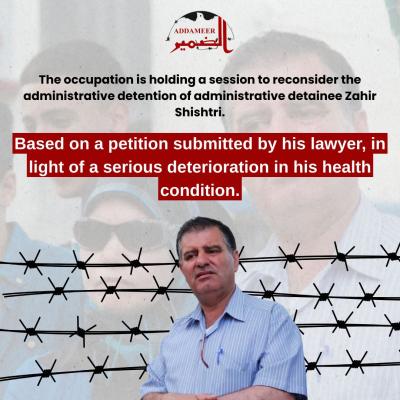
This evening, Monday, the Israeli occupation authorities held a session to reconsider the administrative detention order issued against detainee Zahir Shishtri, who has been detained since August 13, 2024. The session was held based on a petition submitted by his lawyer in light of the serious deterioration in his health condition.
Despite the critical state of his health and the real risk to his life, the judge decided to uphold the full duration of the administrative detention order without renewal so that he will be released on August 11, 2025. It is worth noting that Shishtri was unable to attend the session as he had been transferred to the hospital.
Zahir Shishtri is a former prisoner who has previously spent years in Israeli occupation prisons and has been subjected to multiple arrests throughout his life, including administrative detention. His current arrest is part of a mass arrest campaign carried out by the occupation authorities for over a year and a half as part of a systematic policy that amounts to a crime of genocide against the Palestinian people. He was issued an arbitrary six-month administrative detention order, which was then renewed for an additional six months without any charge, based on what is referred to as a "secret file" and without a clear time limit for his detention.
Detainee Zahir Shishtri, 60 years old, suffers from multiple chronic and serious illnesses that require specialized and continuous medical care. These include multiple sclerosis (MS), diabetes, high blood pressure, severe nerve pain in his legs, as well as aftereffects of a previous stroke.
Shishtri was not transferred to a civilian hospital for treatment until this morning, after months of medical neglect in Megiddo prison, despite his health deteriorating since the beginning of his detention. Just two days ago, prison authorities merely transferred him to the clinic at Ramleh prison, known for its lack of basic medical care, continuing a policy of systematic medical abuse against sick detainees.
This deliberate medical neglect led to a severe deterioration in his condition. He has been unable to move for over three months, and his health has further declined due to complications resulting from delays in receiving proper treatment. He also contracted scabies (sarcoptic mange) inside Megiddo prison amid a widespread outbreak of the disease among detainees due to poor detention conditions and a complete lack of hygiene and medical standards.
What Zahir Shishtri is enduring falls within the broader systematic and retaliatory policies employed by the occupation authorities against Palestinian prisoners since the beginning of their aggression on October 7, 2023. These policies include denial of treatment, reduction of food portions, and tight restrictions on lawyer visits—all part of a deliberate attempt to break their will and deprive them of their most basic rights.
As a result of these policies, at least 69 Palestinian detainees have died since the beginning of the genocide, under inhumane and harsh detention conditions, amid disturbing international silence. It is important to note that this number does not include all detainees from the Gaza Strip who died in Israeli prisons, as the occupation continues to subject them to enforced disappearance in prisons and military camps, raising serious concern about the fate of hundreds of them, in the absence of any transparency regarding their conditions or places of detention.
Addameer Prisoner Support and Human Rights Association calls for an immediate end to the policy of deliberate medical neglect practiced by the Israeli prison administration against detainees, and for the urgent protection of their right to receive adequate healthcare, in accordance with international human rights standards. The organization stresses the need to provide appropriate treatment for sick detainees and to transfer critical cases to specialized civilian hospitals without delay. It also calls for the formation of independent international medical committees to monitor detainees’ health conditions and to hold accountable those responsible for denying them treatment and engaging in deliberate medical neglect, which in many cases amounts to torture and inhumane treatment.